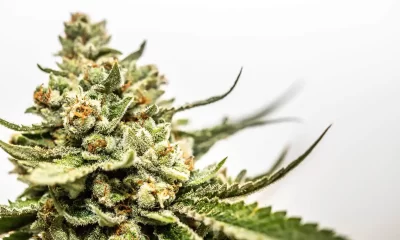Business
Summer 2022 European Cannabis Roundup

Looking back on the trajectory of reform in Europe from the vantage point of 2032, a decade from now, this year, and particularly the spring and summer of 2022, will almost certainly be recognized as the European-wide tipping point for cannabis.
This is largely being driven by current events in Germany. The government just wrapped up several weeks of hearings on how to implement recreational reform. A white paper containing the recommendations of the same will be released in the fall, with draft legislation expected to be published by the end of the year. Beyond that, the timing is understandably a bit hazy, but the bill is widely expected to pass in the early part of 2023, with a recreational market on track to begin by the first part of 2024.
However, Germany is not the only game in town, as much as its impact on the conversation across the E.U. is huge.
The Domino Countries
There are currently several E.U. countries on the verge of recreational reform that stand poised to follow Malta into recreational reform this year by legalizing home grow. These are:
Switzerland – The country is launching its recreational use city trials this year. While outside of the E.U., the country’s forward progress on recreational reform is one of the key markets to watch in Europe right now.
Portugal – Now established as one of the most important medical cultivation countries in Europe, the country is on the verge of formal recreational reform—and will proceed with home grow as a first step to creating a fully integrated recreational market with international juice. Portugal also has the distinction of being the most liberal country on drug policies across the E.U.
Luxembourg – The country’s current government promised to implement recreational reform before the end of their first term (which ends next year). Medical reform was implemented during 2018. Currently, the first step into the adult use market will be home grow also, although given the size of the country, it most likely won’t be a large producer.
Austria – The country will certainly follow its DACH trading partners—Germany and Switzerland—across the recreational line in the near future. Medical reform has already been implemented here and the country as a strong hemp industry.
Medical Reform Is Still in Motion
Adult use reform of course is not the only discussion in the room. Medical reform has also been moving forward in important jurisdictions this year—leaving no major country within the region that does not recognize at least medical efficacy of the plant. Even Albania, in accession talks with the E.U., is moving ahead with medical use.
France – The country formally (and finally) moved forward on a pending medical trial earlier this year. The jury is still out on whether the country’s president Emmanuel Macron, will be pushed by his more liberal government to move forward on some kind of recreational discussion. As the cradle of hemp production in Europe, the country has also been the testing ground for changing CBD policy across the E.U.
Spain – The home of the cannabis club announced their recognition of medical efficacy this summer. This is significant for several reasons, including the fact that Spain is also apparently ramping up its medical cultivation while allowing the clubs to continue to operate.
As a result, Europe is very much having its “2012” moment. By 2024, it is almost certain at this point that there will be, beyond Holland, several European countries where recreational cannabis is legal.
The Global Impact of European Reform
While it is still hard to predict accurately, make no mistake about it: This change is seismic, worth a great deal of money, and will have huge repercussions.
It is unlikely that in the U.S., for example, serious arguments will hold much longer against finally legalizing cannabis on a federal level.
Beyond this, it is almost certain that multiple countries in Asia will follow both events in the E.U. as well as Thailand and probably Indonesia’s early lead. Even if this change is also “only” medical for now, as has been seen worldwide at this point, this is only the first step.
From this vantage point, it is also not hard to envisage a world where the plant is finally, formally recognized, and at an international level.
Does This Mean Smooth Sailing from Here?
Just because legalization is moving however, does not mean there will be no detours much less distractions. This starts with a domestic rollout of reform, which on the recreational front will almost certainly also include some states, cities, and towns also placing a ban on sales.
The discussion about tourism is also much in the balance as Holland continues to make noise about banning cannatourists from Amsterdam. However, it is hard to believe that this will last, even in Holland. Greece, for example, which is already inviting German pensioners to spend a warm winter away from higher gas prices and lower temperatures, will ignore this valuable segment of the market.
On the regulatory front, Novel Food looms as a large and unsolved problem—and not just for CBD but also the full plant discussion.
All of these issues will take time and money to resolve. However, the most important step has clearly been taken in Europe this summer—and that will reverberate in turn, as perhaps the last major push necessary for the final dominoes to begin falling. Regionally and, of course, globally.
Source: https://hightimes.com/news/summer-2022-european-cannabis-roundup/
Business
New Mexico cannabis operator fined, loses license for alleged BioTrack fraud

New Mexico regulators fined a cannabis operator nearly $300,000 and revoked its license after the company allegedly created fake reports in the state’s traceability software.
The New Mexico Cannabis Control Division (CCD) accused marijuana manufacturer and retailer Golden Roots of 11 violations, according to Albuquerque Business First.
Golden Roots operates the The Cannabis Revolution Dispensary.
The majority of the violations are related to the Albuquerque company’s improper use of BioTrack, which has been New Mexico’s track-and-trace vendor since 2015.
The CCD alleges Golden Roots reported marijuana production only two months after it had received its vertically integrated license, according to Albuquerque Business First.
Because cannabis takes longer than two months to be cultivated, the CCD was suspicious of the report.
After inspecting the company’s premises, the CCD alleged Golden Roots reported cultivation, transportation and sales in BioTrack but wasn’t able to provide officers who inspected the site evidence that the operator was cultivating cannabis.
In April, the CCD revoked Golden Roots’ license and issued a $10,000 fine, according to the news outlet.
The company requested a hearing, which the regulator scheduled for Sept. 1.
At the hearing, the CCD testified that the company’s dried-cannabis weights in BioTrack were suspicious because they didn’t seem to accurately reflect how much weight marijuana loses as it dries.
Company employees also poorly accounted for why they were making adjustments in the system of up to 24 pounds of cannabis, making comments such as “bad” or “mistake” in the software, Albuquerque Business First reported.
Golden Roots was fined $298,972.05 – the amount regulators allege the company made selling products that weren’t properly accounted for in BioTrack.
The CCD has been cracking down on cannabis operators accused of selling products procured from out-of-state or not grown legally:
- Regulators alleged in August that Albuquerque dispensary Sawmill Sweet Leaf sold out-of-state products and didn’t have a license for extraction.
- Paradise Exotics Distro lost its license in July after regulators alleged the company sold products made in California.
Golden Roots was the first alleged rulebreaker in New Mexico to be asked to pay a large fine.
Source: https://mjbizdaily.com/new-mexico-cannabis-operator-fined-loses-license-for-alleged-biotrack-fraud/
Business
Marijuana companies suing US attorney general in federal prohibition challenge

Four marijuana companies, including a multistate operator, have filed a lawsuit against U.S. Attorney General Merrick Garland in which they allege the federal MJ prohibition under the Controlled Substances Act is no longer constitutional.
According to the complaint, filed Thursday in U.S. District Court in Massachusetts, retailer Canna Provisions, Treevit delivery service CEO Gyasi Sellers, cultivator Wiseacre Farm and MSO Verano Holdings Corp. are all harmed by “the federal government’s unconstitutional ban on cultivating, manufacturing, distributing, or possessing intrastate marijuana.”
Verano is headquartered in Chicago but has operations in Massachusetts; the other three operators are based in Massachusetts.
The lawsuit seeks a ruling that the “Controlled Substances Act is unconstitutional as applied to the intrastate cultivation, manufacture, possession, and distribution of marijuana pursuant to state law.”
The companies want the case to go before the U.S. Supreme Court.
They hired prominent law firm Boies Schiller Flexner to represent them.
The New York-based firm’s principal is David Boies, whose former clients include Microsoft, former presidential candidate Al Gore and Elizabeth Holmes’ disgraced startup Theranos.
Similar challenges to the federal Controlled Substances Act (CSA) have failed.
One such challenge led to a landmark Supreme Court decision in 2005.
In Gonzalez vs. Raich, the highest court in the United States ruled in a 6-3 decision that the commerce clause of the U.S. Constitution gave Congress the power to outlaw marijuana federally, even though state laws allow the cultivation and sale of cannabis.
In the 18 years since that ruling, 23 states and the District of Columbia have legalized adult-use marijuana and the federal government has allowed a multibillion-dollar cannabis industry to thrive.
Since both Congress and the U.S. Department of Justice, currently headed by Garland, have declined to intervene in state-licensed marijuana markets, the key facts that led to the Supreme Court’s 2005 ruling “no longer apply,” Boies said in a statement Thursday.
“The Supreme Court has since made clear that the federal government lacks the authority to regulate purely intrastate commerce,” Boies said.
“Moreover, the facts on which those precedents are based are no longer true.”
Verano President Darren Weiss said in a statement the company is “prepared to bring this case all the way to the Supreme Court in order to align federal law with how Congress has acted for years.”
While the Biden administration’s push to reschedule marijuana would help solve marijuana operators’ federal tax woes, neither rescheduling nor modest Congressional reforms such as the SAFER Banking Act “solve the fundamental issue,” Weiss added.
“The application of the CSA to lawful state-run cannabis business is an unconstitutional overreach on state sovereignty that has led to decades of harm, failed businesses, lost jobs, and unsafe working conditions.”
Business
Alabama to make another attempt Dec. 1 to award medical cannabis licenses

Alabama regulators are targeting Dec. 1 to award the first batch of medical cannabis business licenses after the agency’s first two attempts were scrapped because of scoring errors and litigation.
The first licenses will be awarded to individual cultivators, delivery providers, processors, dispensaries and state testing labs, according to the Alabama Medical Cannabis Commission (AMCC).
Then, on Dec. 12, the AMCC will award licenses for vertically integrated operations, a designation set primarily for multistate operators.
Licenses are expected to be handed out 28 days after they have been awarded, so MMJ production could begin in early January, according to the Alabama Daily News.
That means MMJ products could be available for patients around early March, an AMCC spokesperson told the media outlet.
Regulators initially awarded 21 business licenses in June, only to void them after applicants alleged inconsistencies with how the applications were scored.
Then, in August, the state awarded 24 different licenses – 19 went to June recipients – only to reverse themselves again and scratch those licenses after spurned applicants filed lawsuits.
A state judge dismissed a lawsuit filed by Chicago-based MSO Verano Holdings Corp., but another lawsuit is pending.
Source: https://mjbizdaily.com/alabama-plans-to-award-medical-cannabis-licenses-dec-1/
-

 Business2 years ago
Business2 years agoPot Odor Does Not Justify Probable Cause for Vehicle Searches, Minnesota Court Affirms
-

 Business2 years ago
Business2 years agoNew Mexico cannabis operator fined, loses license for alleged BioTrack fraud
-

 Business2 years ago
Business2 years agoAlabama to make another attempt Dec. 1 to award medical cannabis licenses
-

 Business2 years ago
Business2 years agoWashington State Pays Out $9.4 Million in Refunds Relating to Drug Convictions
-

 Business2 years ago
Business2 years agoMarijuana companies suing US attorney general in federal prohibition challenge
-

 Business2 years ago
Business2 years agoLegal Marijuana Handed A Nothing Burger From NY State
-

 Business2 years ago
Business2 years agoCan Cannabis Help Seasonal Depression
-

 Blogs2 years ago
Blogs2 years agoCannabis Art Is Flourishing On Etsy













